Wonderful Christmas classic!!!
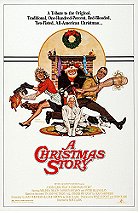 Posted : 17 years ago on 2 June 2008 09:46
(A review of A Christmas Story)
Posted : 17 years ago on 2 June 2008 09:46
(A review of A Christmas Story)A Christmas Story is one of cinema's most superb Christmas movies: a film that children and parents alike frequently watch towards the end of December each year. All and sundry can recall a Christmas movie that possesses a special place in their heart. A Christmas Story is a heart-warming and charming tale that is commonly held in high regard. This film is for both the children and adults because it's something both generations can relate to. While kids will enjoy the Christmas flavour of this saga, the adults will find a deeper experience due to the nostalgia and realism. For many families and cinema buffs, this is traditional viewing every year when the holiday season kicks in.
A Christmas Story is told in a series of flashbacks as we examine the lead up to Christmas from the perspective of little Ralphie Parker (Billingsley) who lives with his typical suburban middle class family in a small town during the 1940s. The only thing Ralphie wants for Christmas is (as he affectionately describes it) the "Holy Grail of Christmas gifts - The Red Ryder 200-shot, Range Model air rifle". However, Ralphie's mother is not pleased with the choice and does not wish to give her son a BB gun for Christmas in fear he will "shoot his eye out" (a recurring phrase spoken by several characters).
The film is about something much more than just a BB gun. A Christmas Story looks at a young boy's perspective on the world in the lead up to Christmas with the BB gun as a mere centrepiece. The saga is narrated by an older version of Ralphie (Shepard, who also wrote the short stories on which the film is based) whose lines of narration are filled with nostalgia as he reminisces about his childhood. The movie is made up of several short vignettes. Each vignette represents a different aspect of Christmas. Basically everything that one would remember about the holiday season is lovingly recreated: meeting Santa at a department store, the socks you receive as a present but never wanted, and so much more. Of course, a lot of these vignettes represent purely American traditions around Christmas time. Those viewers who do not reside in America (like myself) won't be able to relate to the cold weather, the snow or the craze with BB guns among many other things. This does not affect the film's overall value, but it's worth noting.
The characters are of course played to absolute perfection. Young Peter Billingsley is wonderful: not only is Billingsley adorable and cuddly but the very picture of childhood innocence. The actor was at an extremely young age when the camera started rolling. Although still an infant, his acting skills are definitely above average. Melinda Dillon and Darren McGavin are accurate portraits of your standard parent figures. Ian Petrella is dead-on as Ralphie's younger brother: similar to Billingsley he acts like an average child you'd expect to find looming around a toy store. The whole film is lovingly stitched together with the warm narration from Jean Shepard.
A Christmas Story embodies all the qualities of Christmas season from the perspective of an infant. Christmas time will always be the centre of every child's universe; it's the day of the year every kid waits for. The nostalgia of being a child is perfectly portrayed with this sublime movie. It's corny beyond all belief and sometimes fairly predictable (the only aspect in which the film is flawed), but on the contrary the film is exceedingly heart-warming and brilliant. Never before or since has a movie been able to accurately capture the nostalgic flavour of the Christmas season. For many families it will always be tradition to watch it on Christmas Eve.
8.2/10
 0 comments, Reply to this entry
0 comments, Reply to this entry
Quite disappointing
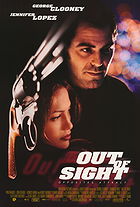 Posted : 17 years ago on 1 June 2008 12:21
(A review of Out of Sight)
Posted : 17 years ago on 1 June 2008 12:21
(A review of Out of Sight)
After spending the decade of the 1990s in the shadows and remaining overlooked, Steven Soderbergh made his mark in Hollywood with Out of Sight: this sufficiently entertaining crime drama. It's rather a daunting task to categorise a Soderbergh production - this film has elements of romance, comedy, drama, crime and thriller. With these elements in mind, the filmmakers have tossed in a dense, intricate, somewhat fractured screenplay to be implemented by a questionable group of actors. The stage is set for something moderately different to occur.
Jack Foley (Clooney) is a habitual bank robber with a formidable record. Jack decides to shorten his current gaol term by conducting a prison break with the assistance of long-time collaborator Buddy (Rhames). However Jack does not expect to encounter US Marshall Karen Sisco (Lopez) during his prison escape. The pair toy around with an obvious mutual attraction. As Jack and Buddy plan their ultimate scam, Karen is assigned to track them down and bring them to justice. It takes about half an hour to establish that plot. Subsequent to the opening half an hour the plot steadily dissolves with each passing minute. Basically the final 90 minutes of the movie (give or take) are concerned with Karen working to capture Jack and Buddy. However Karen begins having second thoughts about arresting Jack as the mutual attraction intensifies.
Out of Sight is equipped with talent in several departments: acting is generally very good, directing is strong and the screenplay is witty. But director Soderbergh's style will not be liked by all. Quite frankly the film loses its appeal and bogs dreadfully throughout the middle section. The problem with Soderbergh's movies is that, although they're sometimes really unpredictable, it's difficult to assess the importance of each scene. With so little action and so much dialogue there isn't much to sustain interest in the viewer. While watching the movie my eyes were glued to the screen but my mind kept wandering off...I could never remain entirely engaged.
Another fatal flaw is the lack of sizzling chemistry between Clooney and Lopez. George Clooney is always highly charismatic and appears abundantly determined. 60% of Clooney's screen-time features some skilfully-written dialogue and some absorbing drama. It's a shame this level of focus isn't maintained - something solely attributed to the mediocre screenwriting. On the opposite end of the spectrum there's a very questionable Jennifer Lopez. Honestly, I have never liked Lopez's acting so perhaps I am biased. Be that as it may, Lopez is poor at maintaining any degree of intensity. Her lines are occasionally quite witty (sometimes more so than Clooney's dialogue), but she does not do justice to the screenplay. There is zero chemistry between Clooney and Lopez. We have a charismatic performer opposite an actress who really requires a few more acting lessons.
Thankfully the supporting cast are a marginal redeeming feature. Don Cheadle's performance is similar to Clooney's - spirited but let down by the film's unique style. Steve Zahn is always a scene-stealer. It's a shame Zahn is allocated such a minor role. His potentiality could have redeemed this film more emphatically. Michael Keaton's insignificant (uncredited) role is also worth mentioning - a former Batman criminally underused.
Overall, Out of Sight is a mediocre crime film that will not be liked by all. Occasionally there's some great dialogue to absorb and a few strong performances. Not that I was looking exclusively for action, but the drama could have easily been balanced out by more frequent action. I'm glad I watched the film; however I doubt I'll be watching it again any time soon.
 0 comments, Reply to this entry
0 comments, Reply to this entry
A Coen Brothers misfire!
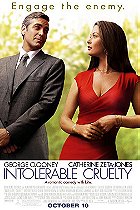 Posted : 17 years ago on 1 June 2008 07:36
(A review of Intolerable Cruelty)
Posted : 17 years ago on 1 June 2008 07:36
(A review of Intolerable Cruelty)The Coen Brothers established a solid reputation for themselves by exploring (and essentially nailing) a vast assortment of diverse genres. With Intolerable Cruelty the filmmaking duo have yet again explored a different style of film - this production being your standard romantic comedy with themes of divorce and love that are so common in our times. Unfortunately this is among the weakest films that the Coen Brothers have created. Even with innovative ideas and concepts they appear incapable of avoiding the clichés and conventions of the genre.
Miles Massey (Clooney) is a high profile divorce attorney with an indestructible reputation. Miles has everything - a formidable win record, an impressive client list, an ironclad marriage contact named after him and the respect of his peers. For a fee, Miles will gladly twist the facts in favour of his client to assist them in wriggling out of their fiscal responsibilities. Miles' latest client is the outrageously wealthy Rex Rexroth (Herrman) who was caught (on film) being an unfaithful husband. Rex's wife Marylin (Zeta-Jones) elegantly plans to sue Rex, receive a phenomenal alimony, and comfortably enjoy a wealthy independence. There's just one problem: Miles. Owing to his work, Marylin leaves the courtroom with nothing. Not to be outdone, Marylin formulates a scheme to get revenge on Miles. Underhanded strategies, deceptions and an indubitable attraction intensifies as Marylin and Miles square off in a classic battle of the sexes.
Despite being written by a talented duo who rarely produce a faulty product, Intolerable Cruelty is nothing more than your average romantic comedy. After the first 10 minutes it's possible to predict the film's ending. Although running at a brisk 95 minutes, the film is an unnecessarily long trip into clichés and poorly written gags that merely postpone the foreseeable conclusion. The film is destined to leave a Coen admirer both cold and unsatisfied. If you worship the brothers as cinematic messiahs...this film will only taint your image of the pair.
I have no complaints regarding the dazzling bunch of talented actors who got involved in the film. George Clooney's performance is filled with charisma and persuasive verbosity. Clooney is one of the finest actors of the contemporary era. I don't worship the man, but I frequently enjoy his work. This film features a Clooney who completely perfects his role. Catherine Zeta-Jones is luminous as an on-screen partner for George Clooney. As a duo, Clooney and Zeta-Jones work extremely well together and frequently emanate comedic energy. They share some witty lines of dialogue between them that supply some of the film's strongest moments. Also in the supporting cast there's a mediocre Cedric the Entertainer and some minor roles skilfully played by actors like Geoffrey Rush and Billy Bob Thornton.
The film is equipped with a steady supply of quality production values - everything looks bright and attractive with a pleasant atmosphere as an accompaniment for the gorgeous visuals.
Intolerable Cruelty isn't groundbreaking or brilliant like other films created by the talented Coen Brothers. This film can be emphatically added to the limited list of their misfires. It's pleasant enough to keep you mildly entertained for a couple of hours and there are some laughs. Perhaps there are sufficient laughs to keep you entertained but you won't conclude the film with overly positive thoughts in your head. It's dangerously bordering on mediocre and terrible. I guess this is proof that even the most talented bunch of filmmakers can miscarry. All in all, the film's title accurately describes how cruel it truly is to sit through this movie.
 0 comments, Reply to this entry
0 comments, Reply to this entry
An outstanding gangster movie!
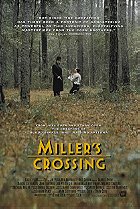 Posted : 17 years ago on 31 May 2008 11:29
(A review of Miller's Crossing)
Posted : 17 years ago on 31 May 2008 11:29
(A review of Miller's Crossing)
Miller's Crossing is an outstanding gangster drama made prior to the Coen Brothers developing into a massive household name. Even in their early days, the duo consisting of Joel and Ethan Coen could produce movies executed with articulate cinematography, witty dialogue and suspenseful action. It's fascinating that the Coen Brothers were able to successfully nail the gangster genre in one attempt with a screenplay they penned themselves.
Miller's Crossing relies solely on its character development to flesh out the plot. Instead of sincerely delving into the lives of several characters, the film is concerned with one man in particular: Tom Reagan (Byrne). Tom is a wise guy and a loner: acting as a quintessential right-hand man to Prohibition-era Irish mob boss Leo (Finney). The story is a complex plot of intrigue, loyalty and betrayal as it examines the morals within the criminal underworld of the 1930s. The film focuses on two rival gangs that contend for control of the city. Tom's loyalties begin to blur when disputes arise between he and Leo over a girl named Verna (Harden). Inadvertently, Tom is now caught in the middle of a gang war while being posed the question of allegiances. On the surface Miller's Crossing is a mob war film, but underneath it's an exploration of the relationships between a horde of interesting characters, largely from Tom's point of view. Most importantly it is fundamentally an examination of Tom's internal conflicts.
Gabriel Byrne is astonishing as Tom Reagan. Interestingly enough, Byrne's performance reminded me of the classic Bogart performances: a wise-cracking, cool, manipulative and likeable rogue. Byrne is very engaging for those with patience. His performance in this film will always be remembered as one of the genre's finest. Albert Finney is at the top of his game. Similar to the rest of the cast, Finney is absorbing whenever he receives screen time. If anything I believe that Finney was underused; appearing rarely into the second half. Jon Polito is terrifying and menacing as the rival mob boss. Polito nailed his character. Every scene he features in he is nothing short of brilliant. I could not spot any flaws or lapses in his concentration.
The style of the Coen Brothers will not be accepted by all. Many of their creative choices are questionable, albeit unique. The pacing is sometimes extremely slow: an aspect that can be attributed to the way they direct the actors. Similar to every dialogue-orientated gangster film in existence, the filmmakers demand patience. Another unique style of the Coen Brothers is the over-the-top violence and bloodshed. You will frequently witness geysers of blood spurting out from a character that has been shot.
The film also boasts some amazing cinematography. Barry Sonnenfeld's career started as a cinematographer before moving further up the ladder to directing. Sonnenfeld's work cannot be faulted.
Miller's Crossing is one of the definitive films of the Coen Brothers, and marks one of their crowning achievements. The film's single fatal flaw is that it's extremely difficult to get into. It's vital to pay attention to every scene otherwise you'll fall behind and struggle to catch up while missing more of the movie. Naturally, this just means that several screenings are necessary. Overall, Miller's Crossing is extremely an entertaining gangster movie that may not be for all tastes. Do not judge too harshly after your first viewing.
 0 comments, Reply to this entry
0 comments, Reply to this entry
A compelling thriller, despite its shortcomings
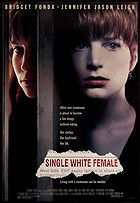 Posted : 17 years ago on 31 May 2008 06:20
(A review of Single White Female)
Posted : 17 years ago on 31 May 2008 06:20
(A review of Single White Female)An erotic thriller with an unhinged female lead, 1992's Single White Female was released mere months after Poison Ivy, The Hand that Rocks the Cradle and Basic Instinct, all of which tread similar thematic ground. Scripted by television veteran Don Roos (his first feature film credit), the movie is an adaptation of John Lutz's 1990 novel "SWF Seeks Same," and the resulting thriller represents a mostly effective genre exercise thanks to a game cast and a capable director in Iranian filmmaker Barbet Schroeder (Reversal of Fortune, Barfly). Single White Female is a gripping slow-burn, evidently taking inspiration from the likes of Alfred Hitchcock and Ingmar Bergman, but, unfortunately, it is unable to stick the landing, with the third act devolving into clichéd slasher movie silliness.
A fashion software programmer living in New York City, Allie (Bridget Fonda) is left hunting for a new roommate to help with the bills after a tough break-up with her cheating fiancé, Sam (Steven Weber). Allie's newspaper advertisement attracts several unsuitable applicants, but she ostensibly finds the perfect housemate in the meek, kindly Hedy (Jennifer Jason Leigh) who is eager to please, forcefully trying to befriend Allie by giving her gifts. However, Allie is creeped out by Hedy's obsessive behaviour, and a hostile rift emerges when Allie welcomes Sam back into her life, reconciling the broken relationship. With Allie and Sam engaged again, Hedy gets dangerously possessive of her housemate, especially with Allie wanting to live with her fiancé. Things only get creepier when Hedy starts modelling her appearance after Allie, buying the same clothes and even getting the same haircut, with Hedy unwilling to let anybody stand between her and the twin sister she has always wanted.
Although not revolutionary in the genre, Single White Female deserves credit for developing the two lead characters beyond surface-level archetypes, exploring Allie's professional and personal life to make her feel like more than just a bog-standard slasher victim. Furthermore, Hedy is not portrayed as an out-and-out villain; rather, she suffers from borderline personality disorder and has a backstory to explain her increasingly obsessive, violent behaviour. It helps that Fonda and Leigh go for broke both emotionally and physically in their respective roles, exhibiting gravitas and intensity, and the two actresses even bare all on several occasions throughout the film. The supporting cast is fine but unspectacular, with Stephen Tobolowsky (Basic Instinct) making the biggest impression as Allie's sleazy client, while Peter Friedman is believable and likeable as Allie's upstairs neighbour Graham.
Schroeder's sense of mood and atmosphere benefits Single White Female, with the movie at its strongest throughout the first hour or so. Schroeder stages ominous and unsettling beats, finding menace in Hedy's behaviour, and creating suspense as Hedy remains unseen in a dark apartment. With Hedy's behaviour continually escalating, Single White Female goes big in its latter stages, leading to a surprisingly action-packed third act that favours histrionic confrontations over nuance or subtlety. There is a way to execute this premise with a bit more tact and realism, but Schroeder and Roos were evidently aiming for a mainstream thriller, sophistication be damned. At least the set-pieces are competent, while the cinematography by Italian veteran Luciano Tovoli (Dario Argento's Suspiria and Tenebrae) is perhaps more stylish than the material deserves, with careful compositions and terrific use of shadows, while the Manhattan apartment - and, by extension, NYC - becomes a character unto itself. Luckily, the picture encapsulates an authentic sense of time and place, with nothing feeling like it was simply shot on a soundstage. Added to this, Howard Shore's score adds some perceptible menace, nicely complementing the visuals.
A distinctive early 1990s feel permeates Single White Female, particularly with the soundtrack choices as well as the recognisably ancient technology glimpsed throughout. Although by-the-numbers in terms of narrative construction, and even though this is an undeniably silly thriller as the finale approaches, the movie remains an enjoyable, compelling watch despite its flaws, and it's easy to laugh at the more over-the-top moments. It's disappointing that the movie never rises to the same level as a classic Hitchcock or Brian De Palma thriller, but it's certainly not the worst movie of its kind. Those who enjoy suspense thrillers will likely get the most out of it, while those who dislike the genre should probably steer clear.
6.7/10
 0 comments, Reply to this entry
0 comments, Reply to this entry
Utterly predictable and dumb!
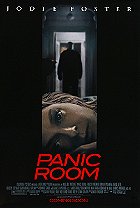 Posted : 17 years ago on 30 May 2008 01:55
(A review of Panic Room)
Posted : 17 years ago on 30 May 2008 01:55
(A review of Panic Room)
Considering David Fincher's stellar reputation with thrillers, I expected significantly more from Panic Room: a film that turned out to be preposterous, derisorily corny thriller yarn that represents the low point of Fincher's career. (The film is even worse than Alien 3 - now that is saying something!) Fincher is a talented director who brings intense thrills and remarkable camera angles; however the script is inexpressibly appalling.
Recently divorced woman Meg Altman (Foster) is now a single mother living with daughter Sarah (Stewart). Searching for a new home, they decide to purchase an expansive old-fashioned house in New York. To the naked eye it seems like a straightforward house, but it includes the latest state-of-the-art security feature designed for paranoid rich people: a panic room. Panic rooms are impregnable secure rooms intended for refuge during a home invasion. They are made from concrete and steel, therefore impossible to break into. Meg and Sarah become imprisoned in their panic room when a trio of thieves enter the house on the search for a lost fortune. Naturally, said lost fortune is actually inside the panic room which is now impossible to break into. Now it's time for the screenwriter to consult the book of film clichés: screenwriter David Koepp arms this film with every convention and cliché one could possibly comprehend.
The script of Panic Room was inspired by the increasing trend of paranoid people who install "safe houses" for extra security. This film is certainly no commercial for panic rooms; in fact it's quite the opposite. It's a good thing panic rooms aren't as flawed in real life! It seems screenwriter Koepp has no problem with moving from one predictable cliché to the next in quick succession. The whole package has been installed here - stupid thieves with one being reluctant, sick child who needs medical attention outside of the confined panic room, overprotective mother who never does one intelligent thing, etc.
I have no idea how such a dreadful screenplay attracted such a magnificent cast. Jodie Foster's performance is intense and involving. A versatile actress of this stature should never appear in a movie like this. Interestingly enough, Foster voluntarily stepped onto the production when Nicole Kidman had to pull out. Forest Whitaker is another of the generation's finest actors tragically dragged into this mess. Whitaker looks out of place, albeit determined. The rest of the cast are impressive, especially young Kristen Stewart.
Whether director David Fincher is your cup of tea or not, you cannot deny that the man has a good eye for detail. Throughout the movie we have elegant cinematography and meticulously detailed shots executed with excellent special effects. The first half of the movie is suspenseful and effective...as the second half commences you will realise how dreadful the script truly is. There is no intensity anymore and the character development appears to be for nothing. As the film kept dragging on I had hoped that the climax would be the film's saving grace. Instead the climax is the poorest part of the movie.
While I was watching Panic Room I wished that I had a panic room of my own - so I could escape this film! Fincher's stylish directing and the top-notch performances from the cast are the only positive aspects of this film. The script is just too horrible for words. This is your typical fluffy Hollywood thriller: convoluted, silly, stupid, filled with plot holes and...did I mention stupid?
 0 comments, Reply to this entry
0 comments, Reply to this entry
The Wachowski Brothers redeemed!
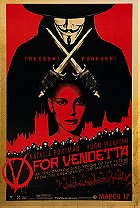 Posted : 17 years ago on 30 May 2008 07:09
(A review of V for Vendetta)
Posted : 17 years ago on 30 May 2008 07:09
(A review of V for Vendetta)The fifth of November,
The gunpowder treason and plot.
I know of no reason
Why the gunpowder treason
Should ever be forgot."
V for Vendetta is a monumental science fiction action-thriller, denoting the duly excellent redemption of The Wachowski Brothers. After helming two horrendously disappointing sequels to their landmark sci-fi picture The Matrix, the brothers have irrevocably redeemed themselves for past blunders with estimable elegance. This outstanding comic book blockbuster is everything one could possibly desire - it's exhilarating, riveting, intense, chilling, electrifying, heartbreaking and extraordinarily entertaining. V for Vendetta is fundamentally a cautionary tale about the rise of fascism and totalitarianism, but it thankfully packs summer-movie pyrotechnics to accompany.
Based on the Vertigo/DC Comics graphic novel (by Alan Moore, illustrated by David Lloyd), V for Vendetta is a futuristic action film set in a dystopian vision of 2020 London. In the wake of a series of devastating terrorist attacks, Chancellor Adam Sutler (Hurt) has ascended to unmitigated supremacy. The general public have forfeited their independence for security; accustomed to exist in a relentless condition of apprehension. Consequently, the perception of constitutional rights for citizens has vanished completely.
A freedom fighter only known as 'V' (Weaving) exercises terrorist diplomacy in an effort to combat the tyrannical society. On the night bridging the fourth and fifth of November, a young British woman named Evey (Portman) is caught by a horde of secret policemen violating the inequitable curfew. The swashbuckling vigilante anarchist V, concealed behind a mask of Guy Fawkes, rescues Evey and she develops into his dubious ally.
Invoking the spirit of Fawkes, V begins the fifth of November by blowing up the Old Bailey to the strings of Tchaikovsky's 1812 Overture. He subsequently ignites a subversive rebellion, marching towards breaking down the fascist government that has taken jurisdiction of Great Britain and has committed atrocities that led the country to its existing condition. V endeavours to eventually reinstate freedom and justice to Britain, as opposed to a society burdened with malice and corruption.
The Wachowski Brothers humbly stepped away from the director's chair, instead adopting a sideline position as writers and producers. Newcomer James McTeigue is an ideal replacement, capable of infusing the film with breathtaking visual flair. Action sequences generally exercise slow motion, but it never grows monotonous. This is one of the only films in history to use slo-mo effectively, which is a testament to the direction and superb cinematography.
V for Vendetta is a solid action film that delivers an insightful political message. The film flawlessly merges a socio-political statement with highly intense stylised action scenes featuring some of the finest cinematic moments of 2005. V for Vendetta is saturated with issues and concepts that permeate the global political climate of the early 21st century, and is endowed with an immense timely relevance that belies its trappings as a mere action adventure. The film is equipped with an intelligent character-driven plot coalesced with greatly assured direction generating the illusion of complete immersion. The action is enthralling and the imagery is stimulating. In addition, the film is kept taut as it moves along at an invigorating pace. The script is smart, thoughtful and provocative. The powerful score is also incredible. Classic orchestral overtures are employed to astonishing effect as an act of anarchy is implemented.
The imagery of 2020 London is marvellously conceived and executed. The intricate metropolis has become grim, depressing and dark. Production design is first-rate, and the top-notch cinematography captures it with consummate skill. The world of V for Vendetta was created mostly with sets and miniatures in Berlin, with some local landscape to finish the portrait of a more noir-ish and sinister London. The filmmakers commendably eschew stereotypical futuristic concepts. There are no flying cars, nor are there any truly notable technological revelations - it never tries to predict any outlandish technology for the future. For this reason (and for many others, like the rare usage of special effects that never exhibit the slightest iota of phoniness), V for Vendetta will never grow outdated.
Hugo Weaving is impeccable in his portrayal of the violent anarchist 'V'. Throughout the movie his face is never revealed as there is no need. V is permanently concealed behind a mask of Guy Fawkes. The mask is not to disguise his identity but it rather acts as a symbol to proclaim his rebellion. The real Guy Fawkes was a Catholic terrorist who unsuccessfully attempted to blow up the British Houses of Parliament in the 1600s. V is a violent man; however his actions are supported by strong logical reasoning. Society becomes governed by fear and violence. As a counteraction, fear and violence is therefore the ideal instrument for change. Weaving's role would have been tremendously challenging to execute as he is always donning a mask; relying solely on his gestures and voice. In all likelihood, V's face is never exposed on account of Weaving's appearance in the Matrix movies - there were so many copies of him (as Mr. Smith) that the actor probably opted to keep his face concealed throughout this film's duration.
Opposite the first-rate Weaving is young Natalie Portman, displaying her unremitting capacity as an actress. She even sports a symbolic Joan of Arc hair-cut in the movie's second half. Evey is the real anchor of the story. The audience automatically empathises with her. She's a reflection of their hopes and fears, and functions as a mirror. She has immense chemistry with Weaving as V, regardless of his face forever being masked. The character of Evey is more impetuous and independent than her comic book counterpart, to the betterment of the film.
The supporting cast is armed with magnificent names like John Hurt, Stephen Rea, and Stephen Fry in addition to numerous others. Hurt in particular is perfect as the narcissistic and cruel tyrannical ruler; ranting and salivating in true fascist style.
Believe the hyperbolic hype regarding this motion picture - V for Vendetta is an outstanding multi-faceted sci-fi production. In addition to being an astonishingly entertaining film it also poses the question of what you're willing to surrender for security. With the contemporary world ruled by fear and dismay, would you renounce your freedom to feel more safe and secure? The film also serves a reminder that the term "terrorist" is defined purely by perspective. As the media poisons us against terrorist actions and utilises propaganda to promote its country, V for Vendetta subtly questions who the terrorists actually are - the anarchists or the government?
V for Vendetta is a revolutionary production that uses its imagery and underlying philosophies as a medium to trigger thought. It's uncommonly provocative for a mainstream movie, and it's pervaded with a marvellous comic book ambiance faithful to its source material. Natalie Portman and Hugo Weaving are a spellbinding duo, and first-time director James McTeigue (who was a second-unit director for The Wachowski Brothers during their Matrix years) demonstrates his ability to stand on his own two feet. In a modern cinematic world, blockbusters prevail and masterpieces are limited. V for Vendetta is both a blockbuster and a masterpiece. It's entertaining and enjoyable, as well as stirring, moving and filled with emotionality. You'll enjoy, you'll cry, and you'll be taking heed of V's immortal words.
10/10
 0 comments, Reply to this entry
0 comments, Reply to this entry
Something far richer than a routine slasher...
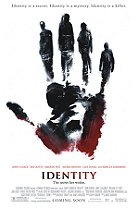 Posted : 17 years ago on 29 May 2008 12:51
(A review of Identity)
Posted : 17 years ago on 29 May 2008 12:51
(A review of Identity)I met a man who wasn't there.
He wasn't there again today
I wish, I wish he'd go away.
Essentially a hybrid of Agatha Christie and Alfred Hitchcock, Identity is a contemporary reinvention of classic mystery/suspense thrillers aimed at today's slasher flick-loving movie-goers. Shades of Psycho and a few creative touches were interweaved into the framework of Ten Little Indians to create Identity, and the result is an engrossing thriller dripping with atmosphere that's imbued with colourful characters and a handful of plot twists. Effectively finding the line between psychological thriller and slasher horror, Identity begins as a seemingly routine excursion into clichés before ultimately metamorphosing into something altogether unexpected and startling.

Identity's narrative takes place in two different basic locations. In a Judge's chambers, a murderer (Taylor Vince) on the eve of his execution is being brought to a hearing by his legal defence when new evidence is brought to light that could potentially rescue him from death row. The main story thread, though, takes place on a dark, stormy night in the Nevada desert. With the roads flooded, a group of seemingly unrelated travellers are forced to check into an out-of-the-way motel. The clichéd group of strangers include limousine driver and former cop Ed (Cusack), the has-been actress that Ed is chauffeuring (De Mornay), a just-retired prostitute (Peet) headed to her Florida hometown to start over, an argumentative newlywed couple (DuVall, Lee Scott), a police officer (Liotta) transferring a dangerous convict (Busey), and a down-on-their-luck family consisting of sincere a sincere stepfather (McGinley), a critically injured mother (Kenzle) and their son (Loehr), not to mention the motel owner (Hawkes). As the weather worsens and the night drags on, the strangers begin getting killed one-by-one by a mysterious killer in what increasingly seems like a systematic fashion.
To further describe the story would spoil the surprises therein, which suffice it to say are best left unspoiled. Nothing equals the satisfaction of seeing this for the first time and being surprised by it.

Questions are raised throughout Identity. Is the motel situation a flashback to the events which got the murderer on death row? Are these two separate events happening concurrently? The uncertainty is all part of the skilful writing which throws buckets of red herrings at us. What's also superlative about the writing is the way we're compelled to guess about the whodunit aspect. Just when we become convinced that one person is the culprit, more red herrings are thrown in until the point when we are just about ready to give up. Reading the premise, you may believe you have Identity all figured out, or sigh with the feeling you've seen this all a thousand times before. Think again. For its first hour, Identity may be a B-grade slasher, albeit one orchestrated with A-grade technique, but then it completely defies expectation with a plot revelation that changes everything. However, this twist is not present for the mere hell of it - it has a true purpose for being. The twist transforms the film from what could've been a conventional high-gloss slasher into something deeper, richer and more existential in nature. All the apparent clichés are in fact just a set-up - they are more like a MacGuffin. The clichés seem to be the focus of the movie, but they are in truth a distraction from the filmmaker's true agenda.
In theory, the idea of shooting the majority of a film on a conventional dark and stormy night is the kiss of death, but director James Mangold is a skilled craftsman capable of sustaining tension and atmosphere; bringing the somewhat unremarkable script to life with transfixing technique. Identity is not an overly frightening or gory movie - it is more of a Hitchcockian thriller. The stormy night-time setting lends the film an appropriate noir tone, accentuating the uncertainty of what is right around the corner. Mangold does deploy such clichés as jump scares with regularity, yet the director executed these moments with a sense of style and panache; showing that old devices can still work if done effectively. It also helps that Mangold was aided by the sumptuously moody cinematography by Phedon Papamichael which expertly uses shadows and pouring rain for maximum effect, in addition to the well-judged editing by David Brenner which keeps the pacing tight. If there's a flaw with Identity, it's that the dialogue is not always solid, and there are moments of sheer silliness which simply don't sit right.

Each member of the cast had minimal material to work with since they were playing a genre type without much psychological background. Nevertheless, the top-notch assemblage of acting talent makes each character feel real and unique, which is crucial to the narrative's ultimate destination. John Cusack has always been an amiable screen presence who specialises in laidback, everyman kind of roles, and his portrayal of Ed makes for an engaging protagonist. Usually in genre films of this type, the female protagonist is on hand to run and scream, but Amanda Peet develops her role of a former prostitute into something far more than a helpless heroine. The excellent Peet matches Cusack scene for scene. John C. McGinley was allotted a minor role, yet he's fascinating and he brings a wonderful, believable energy to his character. McGinley has proved time and time again that he's a superb character actor (Scrubs, anyone?), and Identity further reinforces this. Everyone else - especially the compelling Ray Liotta, the off-kilter John Hawkes, and bright young newcomer Bret Loehr - are terrific in their deliberately archetypal roles.
Ultimately, whether or not Identity will work for you entirely depends on how you perceive the third act. The twist may be seen as moronic by some, while others may be disappointed that the film does not go through with what is expected of a spooky whodunit slasher, and it will probably not be liked by those who don't pay close attention and decide to predict everything out loud with utmost arrogance and cynicism. However, for those tired of the same old thing, Identity is a surprisingly challenging and rewarding genre flick; a true gem in a sea of bland, by-the-numbers psychological thrillers. The premise may seem overused, but the execution coupled with a few delicious twists makes this an absolute must-see.
8.2/10
 0 comments, Reply to this entry
0 comments, Reply to this entry
Taut, entertaining thriller
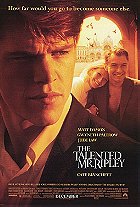 Posted : 17 years ago on 28 May 2008 11:39
(A review of The Talented Mr. Ripley)
Posted : 17 years ago on 28 May 2008 11:39
(A review of The Talented Mr. Ripley)
Patricia Highsmith's novel of the same name was held in high regard in the literary world. Anthony Minghella (R.I.P), celebrated director of The English Patient, has made a terrific psychological thriller out of the already outstanding source material. The Talented Mr. Ripley subsists as a terrifically unique, mysterious drama/thriller assisted by a marvellous horde of actors and some exotic locations.
Initially set in late 1950's New York, the film introduces its audience to a young underachiever named Tom Ripley (Damon). Tom is talented at playing the piano in addition to possessing the skill to impersonate people, yet he is down on his luck. After playing the piano at an upper class garden party he meets the wealthy Herbert Greenleaf (Rebhorn): the father of recent Princeton graduate Dickie Greenleaf (Law). Herbert mistakes Tom for a recent graduate of Princeton University who also knew his son - and Tom lets Herbert believe it. Tom is offered $1,000 to travel to Italy and convince Herbert's son Dickie to return to New York. Down on his luck and with very little money, Tom reluctantly agrees. Upon arrival in Italy, Tom meets with Dickie who is in the company of cultured girlfriend Marge (Paltrow). Dickie is a rich boy with inclination for nothing more than sailing his yacht, masquerading as a playboy and spending time with Marge. Following a few initial meetings, Tom grows an attachment to Dickie and Marge: he is fond of their style of living and develops a mad obsession for Dickie. Tom begins compounding lies, fundamentally assuming the identity of Dickie Greenleaf.
Director Minghella expertly creates three quarters of an excellent movie, with the concluding segment transforming into a complex amalgamation of typical clichés with little to sustain one's interest. This can also be attributed to the film's length - it seems the screenwriter was incapable of upholding any further appeal from limited subject matter. Of course, the subject matter is fascinating by all accounts; however it lost its overall appeal with gross over-length and sluggish screenwriting.
Screenplay flaws aside, The Talented Mr. Ripley is overall somewhat staggering to watch. Anthony Minghella is an expert at the helm of a thriller. This essentially Hitchcockian thriller is occasionally very exhilarating with strong directing and outstanding performances in addition to gorgeous scenery and an elegant setting to boot.
Matt Damon became a household name with Good Will Hunting. Triggering elements of his brilliant portrayal in that earlier film, Damon is in one of his best performances to date. I don't think we've ever seen Damon with this level of vigour or intricacy surrounding him. He is supported by a number of equally excellent performers. Cate Blanchett once again displays her amazing skills as an actress. The film also flaunts great performances from Jude Law and Philip Seymour Hoffman. Law and Hoffman do a fine job in convincing us of the playboyish nature of their characters. Gwyneth Paltrow's portrayal is moderate. Paltrow is a mediocre actress still incapable of painting an entirely convincing character portrait.
The Talented Mr. Ripley is a fine psychological thriller boasting a wonderful ensemble of excellent actors. Some have called this a Hitchcock production of the 90s. I strongly agree. Matt Damon's ability to represent a human leach is amazing at times, proven by the scenes when I actually had sympathy for him. There are scenes of utter shock and dismay, but it is the engulfing build to the inevitable murder and mayhem that grabs you. By all accounts this film is by no means perfect due to some problems in the screenwriting department; however this is a thriller definitely worth checking out.
 0 comments, Reply to this entry
0 comments, Reply to this entry
A benchmark in screen performances!
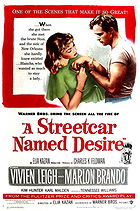 Posted : 17 years ago on 27 May 2008 01:17
(A review of A Streetcar Named Desire)
Posted : 17 years ago on 27 May 2008 01:17
(A review of A Streetcar Named Desire)
A Streetcar Named Desire is a compelling, mesmerising drama that exhibits a benchmark in revolutionary screen performances. This formidable tour de force hasn't dated one iota: even after several decades the film's prominent themes and potent nature are still convincingly evident. This is an example of filmmaking from Hollywood's golden age. The magic of these classics will never be recaptured by any modern filmmakers.
Based on a successful play by Tennessee Williams, we follow Blanche DuBois (Leigh) as she arrives in New Orleans suffering from a condition of psychological apprehension attributed to a number of financial difficulties. Blanche comes to New Orleans to visit her sister Stella (Hunter) who had recently gotten married to the authoritative Stanley Kowalski (Brando). The lives of Stella and Stanley are overturned by the arrival of Blanche: a sexual disturbed, delicate and neurotic woman on a frantic prowl for someplace in the world to call her own. Blanche is in a world of illusion as she is immediately drawn into a battle of wills with her intimidating brother-in-law who lacks in refinement. With the brutal, terrestrial Stanley in her life, Blanche's world begins to crumble as she slowly finds her circumstances unbearable.
This is the essential performance from Marlon Brando: a truly electrifying piece of acting that earned him an Oscar nomination (he ultimately lost to Humphrey Bogart). Stanley Kowalski is an animalistic individual brilliantly captured in two different styles by actor Brando. Many of his lines are absolutely unforgettable. (The most notable line of Brando's is his much imitated, much parodied line "Hey, Stellaaaaaaa!")
Brando is not the only stand out in the cast: we also have an outstanding performance from Vivien Leigh in the title role. Leigh earned herself an Oscar with this astonishingly realistic, haunting, stimulating and extraordinary performance. Leigh's portrayal is one of the finest screen performances in cinematic history. She never strikes a false note and always keeps the audience enthralled throughout the film's duration. As questions regarding her sanity arise, Leigh always remains 100% focused. An Oscar was also awarded to Kim Hunter whose performance is incredibly unforgettable.
I can't stress this enough: the central three protagonists are flawless in every respect. This high level of determination is a rarity in modern cinema. The film was also awarded with an Oscar for actor Karl Malden in addition to an Oscar for the film's elegant art direction and set decoration. There were several other nominations, including Best Picture, Best Music and Best Director.
A Streetcar Named Desire features an undeniably stunning, spellbinding score. This jazzy music was highly influential at the time of release. Even now the music is disturbing and haunting. This music sets the mood amazingly, and is complimented with the stylish directing and incredible black & white photography.
A Streetcar Named Desire is a classic production that welcomed a new era of filmmaking. This will always be one for the history books: a timeless movie that exhibits magnificent performances and persuasive themes. Marred only marginally by its slow pacing during the middle section.
When the film was initially released the censorship board removed a few minutes of the film that underscored the sexual tension between the central characters. These few minutes were eventually restored back into the movie.
 0 comments, Reply to this entry
0 comments, Reply to this entry
 Login
Login
 Home
Home 183 Lists
183 Lists 1671 Reviews
1671 Reviews Collections
Collections
